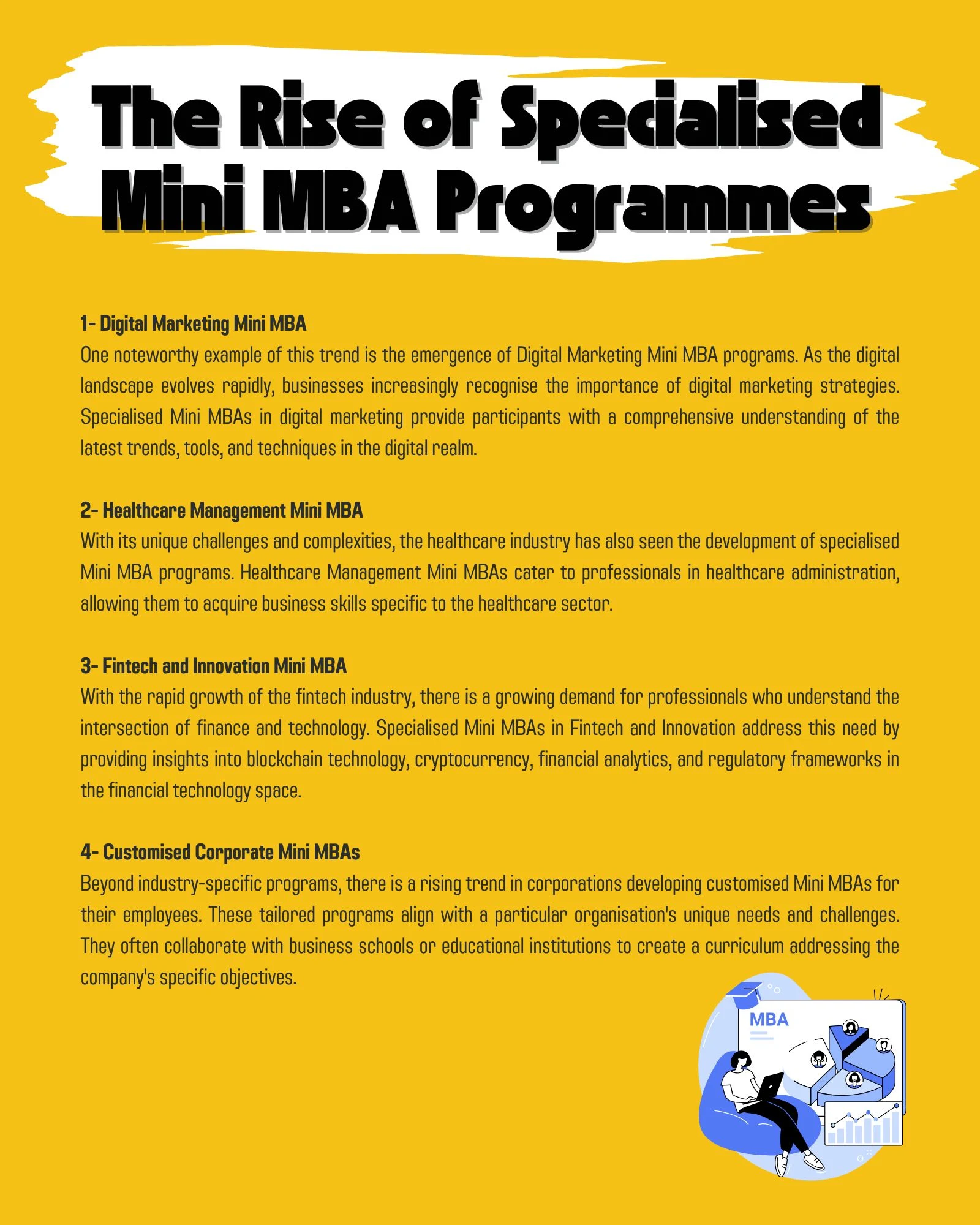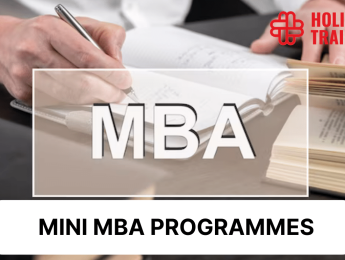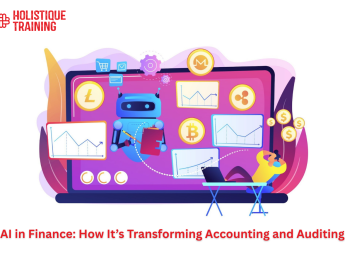- Table of Contents
- What Is a Mini MBA?
- Is a Mini MBA Worth Your Time and Money?
- What Do Employers Think of Mini MBAs?
- How a Mini MBA Benefits You
- Flexibility and Time Management
- Broad Business Knowledge
- Networking Opportunities
- Skill Enhancement
- Cons of Mini MBAs
- Depth of Learning
- Credibility and Recognition
- Not a Substitute for Experience
- Considering the Trade-Offs
- Should You Take the Leap?
- Evaluate Your Objectives
- Research Program Quality
- Assess Cost and Time Commitment
- The Rise of Specialised Mini MBA Programmes
- 1- Digital Marketing Mini MBA
- 2- Healthcare Management Mini MBA
- 3- Fintech and Innovation Mini MBA
- 4- Customised Corporate Mini MBAs
- Impact on Career Advancement
- Choosing the Right Specialisation
- The Impact of Technology on Mini MBA Delivery
- Rise of Online Platforms and Virtual Classrooms
- Interactive Learning Modules and Simulations
- Mobile Learning and Accessibility
- Virtual Networking and Collaboration
- Recognition of Virtual Learning by Employers
- Challenges and Considerations
- The Future of Technology in Mini MBA Education
- Conclusion
In the dynamic and fast-paced business world, continuous learning and self-improvement are essential for personal and professional growth. Traditionally, a Master of Business Administration (MBA) has been the go-to choice for those seeking to expand their business knowledge and advance their careers. However, not everyone can commit the time and resources required for a full-fledged MBA programme. This is where Mini MBA programmes step in, offering a more flexible and focused alternative. In this blog post, we will delve into the world of Mini MBAs, examining their value, benefits, and potential drawbacks.
What Is a Mini MBA?
A Mini MBA is a compact, intensive educational programme designed to provide participants with a condensed version of the core principles and fundamental concepts taught in a traditional MBA program. These programmes are typically shorter in duration, ranging from a few days to a few months, as opposed to the two-year commitment required by full MBA programmes. Mini MBAs offer a glimpse into various business disciplines, covering finance, marketing, management, strategy, and entrepreneurship topics.
Aspect | Mini MBA | Traditional MBA |
Duration | Short (Days to Months) | Long (Two Years) |
Cost | Affordable | Expensive |
Flexibility | High | Limited |
Depth of Learning | General Overview | In-Depth Specialisation |
Career Disruption | Minimal | Significant |
Networking Opportunities | Present | Extensive |
Table 1: Comparison of a mini MBA and a traditional MBA
Is a Mini MBA Worth Your Time and Money?
The answer to this question largely depends on your specific goals, circumstances, and expectations. Mini MBAs can be a great investment for professionals seeking to enhance their business acumen without committing to a full MBA. If you want to level up your skills, explore different business domains, or gain a competitive edge in your industry, a Mini MBA can be an effective and efficient way to do so.
Moreover, Mini MBA programmes are often more affordable than traditional MBAs, making them accessible to a wider audience. They also save time, allowing participants to continue working while studying, thereby minimising career disruptions.
What Do Employers Think of Mini MBAs?
Employers' perceptions of Mini MBA programmes can vary, as with any educational pursuit. Some employers highly value the knowledge and skills acquired through such programmes, appreciating the initiative and commitment demonstrated by employees undertaking additional education.
On the other hand, some employers may prefer candidates with full-fledged MBAs from reputable institutions. They might view traditional MBA programmes as more comprehensive and rigorous, offering a deeper understanding of business principles and strategies. However, the tide is turning, and many employers now recognise the value of Mini MBAs as a supplementary source of knowledge and a demonstration of dedication to professional development.
How A Mini MBA Benefits You
The advantages of undertaking a Mini MBA are multifaceted. It offers a blend of flexibility, comprehensive business knowledge, networking opportunities, and skill enhancement. These benefits collectively contribute to the professional growth and development of individuals seeking to augment their business acumen.
Flexibility and Time Management
A primary advantage of a Mini MBA is its flexibility, catering to the demanding schedules of working professionals. Unlike traditional two-year MBA programs, Mini MBAs are designed to accommodate individuals juggling career responsibilities, personal commitments, and educational pursuits. This flexibility is especially valuable for those who cannot afford to take an extended hiatus from their careers but still wish to invest in their professional development.
Broad Business Knowledge
Mini MBA programs provide a holistic overview of various business domains, offering participants a comprehensive understanding of the interconnectedness of different business functions. This breadth of knowledge enables individuals to make more informed decisions and contribute effectively to their organisations. By covering key areas such as finance, marketing, management, strategy, and entrepreneurship, Mini MBAs equip participants with a well-rounded understanding of the business landscape.
Networking Opportunities
Similar to their traditional counterparts, Mini MBA programs offer excellent networking opportunities. Participants engage with diverse professionals from various industries, creating a platform for building valuable connections. Networking is a vital component of career advancement, and the relationships formed during a Mini MBA can open doors to collaborations, mentorships, and career opportunities. The shared learning experience fosters a sense of camaraderie among participants, creating a supportive professional network.
Skill Enhancement
Mini MBA programs are crafted to develop essential business skills that are highly transferable across industries. These include leadership, problem-solving, communication, and critical thinking skills. The emphasis on practical applications and real-world scenarios ensures that participants grasp theoretical concepts and acquire the skills necessary to excel in their roles. As businesses evolve, the ability to adapt and apply a diverse skill set becomes increasingly valuable, making Mini MBA graduates versatile and sought after in the job market.
A Mini MBA is a strategic investment in one's career, offering a flexible and efficient avenue for individuals to enhance their business acumen. Whether seeking to climb the corporate ladder, transition to a new industry, or embark on entrepreneurial endeavours, the benefits derived from a Mini MBA contribute significantly to personal and professional advancement.
Cons of Mini MBAs
While Mini MBA programs come with numerous advantages, it is crucial to acknowledge and understand their limitations. Being aware of these drawbacks allows prospective participants to make informed decisions and align their expectations with the reality of what a Mini MBA can offer.
Depth of Learning
One significant drawback of Mini MBA programs is the potential lack of depth compared to their traditional counterparts. Due to the condensed nature of these programs, participants may receive a broad overview of various business disciplines, but they might not delve as deeply into specific subjects. For individuals seeking in-depth expertise in a particular business area, such as finance or strategy, a traditional MBA program with its extended duration and focused curriculum might be more suitable.
Credibility and Recognition
The credibility and recognition of Mini MBA programs can vary widely depending on the institution or provider. While reputable business schools and universities offer some programs, others may lack the same level of recognition. Prospective participants must carefully research and evaluate the reputation of the program and the institution offering it. Opting for programs with a proven track record and positive reviews ensures that the knowledge gained holds weight in the job market and is respected by employers.
Not a Substitute for Experience
While Mini MBA programs provide valuable insights and theoretical knowledge, they cannot replace the experiential learning gained through years of hands-on work in the field. Real-world experience remains a vital component of professional development, and employers often prioritise candidates with a combination of education and practical experience. Mini MBA graduates should be aware that, despite the enhanced knowledge and skills acquired, the program is a supplement to, not a substitute for, real-world work experience.
Considering the Trade-Offs
While Mini MBAs offer a flexible and time-efficient way to enhance business knowledge, potential participants should carefully consider the trade-offs. The decision to pursue a Mini MBA over a traditional MBA involves weighing the benefits of flexibility and affordability against the potential limitations in depth and recognition. Understanding one's specific career goals and the level of expertise required is essential in making an informed choice.
In short, the cons of Mini MBA programs underscore the importance of thoughtful consideration before enrollment. Prospective participants should assess their career objectives and research program quality and be aware of the trade-offs involved. Despite these drawbacks, many individuals find that the advantages of a Mini MBA align closely with their professional aspirations, offering a strategic and efficient pathway to career advancement. Ultimately, the decision to pursue a Mini MBA should be based on carefully evaluating personal and professional goals, ensuring that the chosen program aligns with the desired outcomes and expectations.
Should You Take the Leap?
Enrolling in a Mini MBA programme depends on your goals and circumstances. A Mini MBA might be the perfect fit if you seek to broaden your business knowledge, explore new opportunities, or gain a competitive edge without committing to a full-time MBA.
According to an article published by Fortune, Peter Methot, associate dean of executive education and assistant professor of professional practice at Rutgers University’s Rutgers Business School, explains the majority of Mini MBA seekers at Rutgers hold an undergraduate degree from over a decade ago, boast substantial work experience, and aim to bridge gaps in their business knowledge.
So, if you find yourself in a similar position – possessing an undergraduate degree over a decade ago and boasting significant work experience – a Mini MBA programme could be a compelling option to consider as you leap-advancing your career and fill any existing knowledge gaps.
If that is not the case, you could consider the following factors before making your decision:
Evaluate Your Objectives
Clearly define your goals and what you hope to achieve from a Mini MBA programme. Understanding your objectives will help you identify if the programme aligns with your professional aspirations.
Research Program Quality
Thoroughly research different Mini MBA offerings, considering factors such as curriculum, faculty, delivery methods, alumni testimonials, and industry recognition. Opt for programmes provided by reputable institutions with a proven track record.
Assess Cost and Time Commitment
Compare the costs and time required for the Mini MBA programme to your budget and availability. Ensure that the investment aligns with the potential benefits you will gain from the programme.
The Rise of Specialised Mini MBA Programmes
In recent years, there has been a notable surge in the popularity of specialised Mini MBA programs. These tailored educational offerings are designed to meet the specific demands of industries or address the need for expertise in certain skill sets. Unlike traditional Mini MBAs that provide a general overview of business principles, specialised programs dive deeper into niche areas, offering participants a more targeted and in-depth learning experience.

1- Digital Marketing Mini MBA
One noteworthy example of this trend is the emergence of Digital Marketing Mini MBA programs. As the digital landscape evolves rapidly, businesses increasingly recognise the importance of digital marketing strategies. Specialised Mini MBAs in digital marketing provide participants with a comprehensive understanding of the latest trends, tools, and techniques in the digital realm. Topics may include social media marketing, search engine optimisation (SEO), content marketing, and data analytics. Professionals in marketing roles or those seeking to transition into digital marketing find these programs particularly valuable.
2- Healthcare Management Mini MBA
With its unique challenges and complexities, the healthcare industry has also seen the development of specialised Mini MBA programs. Healthcare Management Mini MBAs cater to professionals in healthcare administration, allowing them to acquire business skills specific to the healthcare sector. Participants delve into topics such as healthcare policy, financial management in healthcare, and technology integration in medical settings. This specialised knowledge is crucial for individuals aiming to advance their careers in healthcare leadership positions.
3- Fintech and Innovation Mini MBA
With the rapid growth of the fintech industry, there is a growing demand for professionals who understand the intersection of finance and technology. Specialised Mini MBAs in Fintech and Innovation address this need by providing insights into blockchain technology, cryptocurrency, financial analytics, and regulatory frameworks in the financial technology space. This program is ideal for finance professionals, entrepreneurs, and anyone looking to navigate the evolving financial services landscape.
4- Customised Corporate Mini MBAs
Beyond industry-specific programs, there is a rising trend in corporations developing customised Mini MBAs for their employees. These tailored programs align with a particular organisation's unique needs and challenges. They often collaborate with business schools or educational institutions to create a curriculum addressing the company's specific objectives. Corporate Mini MBAs can cover topics such as leadership development, innovation strategies, and industry-specific challenges, providing employees with skills directly applicable to their roles.
Impact on Career Advancement
Specialised Mini MBA programs deepen participants' knowledge in specific areas and enhance their marketability in competitive industries. Employers increasingly value candidates with targeted expertise, and completing a specialised Mini MBA demonstrates a commitment to staying abreast of industry trends and developments. Networking within these niche programs can also lead to valuable connections within specialised sectors, opening doors to career advancement opportunities.
Choosing the Right Specialisation
Evaluating the options carefully is crucial for professionals considering a specialised Mini MBA. Consider factors such as the curriculum's relevance to your career goals, the reputation of the institution offering the program, and the success stories of previous participants. Researching industry trends and consulting with mentors or industry experts can help you decide which specialisation best aligns with your career aspirations. In short, the rise of specialised Mini MBA programs reflects a shift towards more targeted and industry-relevant education. These programs empower professionals to acquire specialised knowledge and skills, enhancing competitiveness in dynamic and rapidly evolving sectors. As industries continue to evolve, the demand for specialised expertise is likely to grow, making specialised Mini MBAs an increasingly valuable investment in one's professional development.
The Impact of Technology on Mini MBA Delivery
In the ever-evolving landscape of education, technology has played a transformative role in reshaping the delivery of Mini MBA programs. The integration of technological advancements has not only expanded accessibility but has also introduced innovative learning methods, enriching the overall educational experience for participants.
Rise of Online Platforms and Virtual Classrooms
One of the most significant impacts of technology on Mini MBA programs is the proliferation of online platforms and virtual classrooms. This shift has democratised access to business education, allowing professionals from around the globe to enrol in programs offered by esteemed institutions without the constraints of geographical boundaries. Online learning platforms offer flexibility, enabling participants to engage with course materials at their own pace while balancing work and personal commitments.
Interactive Learning Modules and Simulations
Technology has facilitated the creation of interactive learning modules and simulations, providing a more dynamic and engaging learning environment. Mini MBA programs leverage multimedia elements, case studies, and simulations to immerse participants in real-world business scenarios. This interactive approach enhances understanding and allows for the practical application of theoretical concepts, preparing participants for the complexities of the business world.
Mobile Learning and Accessibility
Mobile learning has further revolutionised the delivery of Mini MBA programs. Participants can now access course materials, lectures, and collaborative platforms directly from their smartphones or tablets. This flexibility in learning ensures that professionals can engage with the content on the go, making education more adaptable to their busy schedules. Mobile learning also encourages microlearning, where participants can consume bite-sized educational content, enhancing retention and understanding.
Virtual Networking and Collaboration
Technology has not only impacted the learning aspects but has also transformed networking opportunities within Mini MBA programs. Virtual networking events, discussion forums, and collaborative projects enable participants to connect with peers, industry experts, and faculty members worldwide. This global networking fosters diverse perspectives, creating a rich learning environment and expanding professional connections beyond geographical boundaries.
Recognition of Virtual Learning by Employers
As technology continues shaping the education landscape, employers increasingly recognise virtual learning experiences. Completing a Mini MBA program through virtual platforms showcases a candidate's adaptability to modern work environments and technology-driven learning. Employers increasingly appreciate professionals who have successfully navigated and excelled in virtual classrooms, recognising the practical skills gained through online collaboration and remote communication.
Challenges and Considerations
While the impact of technology on Mini MBA programs is largely positive, challenges exist, such as the potential for decreased face-to-face interaction and concerns about the effectiveness of virtual learning. Institutions offering these programs must ensure that the technology used is intuitive, reliable, and conducive to effective learning. Additionally, the digital divide in access to technology must be considered to ensure inclusivity and equal opportunities for all participants.
The Future of Technology in Mini MBA Education
Looking ahead, the role of technology in Mini MBA programs will likely continue evolving. Artificial intelligence (AI), virtual reality (VR), and augmented reality (AR) may become integral components of these programs, offering immersive and personalised learning experiences. Institutions must stay abreast of technological advancements to ensure their programs remain relevant and effective in preparing professionals for the challenges of the future business landscape.
Technology's impact on Mini MBA delivery has been transformative, making education more accessible, interactive, and adaptable. As technology advances, educational institutions must leverage these tools thoughtfully, ensuring that Mini MBA programs remain at the forefront of innovative and effective business education. Conversely, professionals stand to benefit from the flexibility and richness of experiences that technology brings to their educational journey.
Conclusion
A Mini MBA programme can be a powerful tool for accelerating your career, boosting your business acumen, and expanding your professional network. While it may not offer the same level of depth as a traditional MBA, its flexibility, shorter duration, and affordability make it an attractive option for ambitious professionals.
However, suppose you cannot pursue a Mini MBA now due to time or financial constraints but still seek opportunities to upskill, reskill, or explore new skills. In that case, our training programmes might just be the right fit for you. We offer comprehensive and hands-on courses in various industries worldwide, available in three different learning formats: online, in-house, on-demand, and classroom. Regardless of your chosen path, investing in continuous learning will undoubtedly equip you with the tools to thrive in an ever-evolving business landscape. Contact us now for more information!























